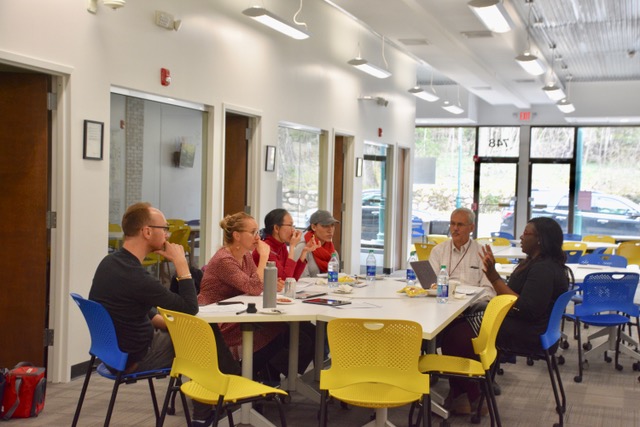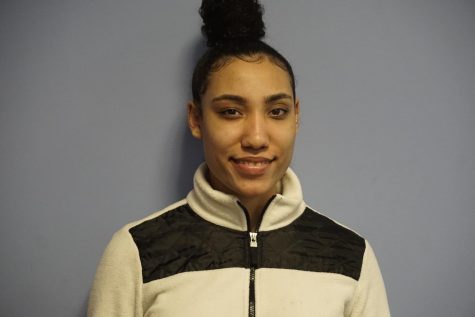Lunch & Learn event discusses trends in healthcare, how professors can prepare students for future careers
Faculty members discuss how to implement service into their course work at GaelVentures.
April 17, 2019
The Hynes Institute for Entrepreneurship and Innovation hosted a Lunch & Learn with Desiree Frieson, an adjunct professor at Iona, on April 11.
The event was meant for faculty to join the lunch and discuss the new trends in healthcare, as well as learn new skills to teach to their students to prepare them for their future careers in their chosen fields.
“We want to research what else is needed in tomorrow’s work force and how we can help with that,” Frieson said.
The trends discussed at the event included: blockchain in biotechnology, behavioral health epidemics, precise mental health assessments, healthcare cyber security, robotics process automation and a value-based model of care.
The group also talked about what needs were most prevalent in the community. This included a discussion about which communities are disadvantaged to leveraging health technology, population health issues, patient access to insurance, data management and wellness. Through identifying these needs, Frieson believes that students can find career pathways.
“Community-based locations do not have the same resources that other private locations would have, like newer technology,” she said. “Students should be able to fill those gaps.”
Faculty members were expected to leave with new knowledge of ideas on how to create experiential-learning opportunities like service-learning projects and courses for their students.
“I think it was important because it took a look at the potential opportunities for the college and students at the college to identify, develop and utilize skills that will be relevant in healthcare in the near future,” adjunct biology professor, Dr. John J. LaMassa, said.
LaMassa also wants to incorporate some skills discussed during the event into his course work for his students.
“Data analysis is one of the underlying skills,” LaMassa said. “I hope to incorporate more opportunities for the data analysis.”
Professors from different departments benefitted from the Lunch & Learn. Dr. Michelle Veyvoda, an assistant professor and speech-language pathologist in the Speech Communication Studies department, attends many of the events so that she could gain information for her students.
“I try to attend as many Lunch & Learns at the Hynes Institute as possible,” Veyvoda said. “I plan to apply for an Innovating Teaching fellowship grant through the Hynes Institute, and these workshops can be helpful in helping me to frame innovating teaching ideas. In addition, since this workshop was specifically focused on service-learning and the health professions, I felt it would be valuable since I use service-learning in a health-related course.”
Veyvoda also plans on developing new curriculum with the knowledge she received.
“I felt I left the workshop with some ideas already in place regarding how I’d use what I learned,” she said. “The speaker was really open to including me in one of her upcoming Employer Roundtables, which I plan to observe since I will be doing a similar project here at Iona over the summer. I also got some ideas for new courses that could be offered in the health sciences that could cover ethics and technology.”
Frieson wants the faculty at the Lunch & Learn to take advantage of the information they obtained and work them into their courses.
“We want to see information about how health professionals could take advantage of the new skills that could help them facilitate to the new workforce and how,” Frieson said. “With this, they can create new-service based opportunities out in the field, and now professors can apply these new skills in their courses.”
Frieson also discussed ways that students could learn community needs from employers. She suggested creating a roundtable so students could learn from health care organizations about topics related to the field, such as the development of field-research classes and technology startup externships, as well as create a survey of health careers and service learning. According to Frieson, these resources could help identify the needs of employers and how students can impact the community around them.









